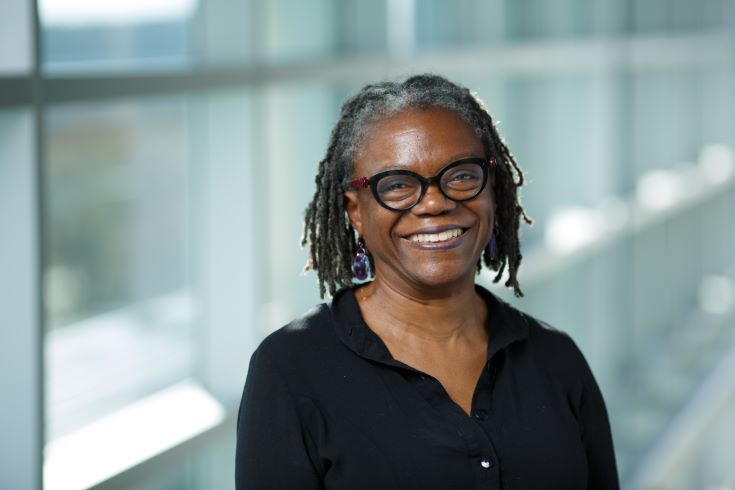Faculty Spotlight: Faith Smith
 Every month, we interview a faculty member for our undergraduate newsletter. In February 2023, we spoke to Faith Smith, the inaugural Marta F. Kauffman Chair in African and African American Studies.
Every month, we interview a faculty member for our undergraduate newsletter. In February 2023, we spoke to Faith Smith, the inaugural Marta F. Kauffman Chair in African and African American Studies.
Can you tell me a little about your academic background and journey to Brandeis?
I majored in Literatures in English as an undergraduate at the University of the West Indies in Jamaica, and did an MA in African American Studies at the University of Wisconsin-Madison, before pursuing a PhD in the Program in Literature at Duke University. At Brandeis I teach courses that allow me to connect my interests in Caribbean, Black Diasporic and postcolonial literary cultures, and the extent to which histories of African and Asian enslavement and indentureship in the Caribbean continue to shape the region’s cultural production, as well as ideas about intimacy, kinship and justice. Working on a research project, or engaging with a poem, novel, or a painting, I realize that some conundrum that I had been unable or didn’t have the time to work out in the past, has now re-presented itself in a fresh way. This is partly the advantage (and the challenge!) of working across multiple fields and disciplines: African and African American Studies (AAAS) and English; and Creativity, the Arts and Social Transformation (CAST), Latin American, Caribbean and Latinx Studies (LACLS), and Women’s, Gender, and Sexuality Studies (WGSS).
What interests you about the intellectual and cultural histories of the Caribbean?
How much time do we have? Let me just say this: as a major site of capitalism’s most violent and imaginative experiments (which agricultural crops have the greatest market value, and under what conditions? how much pain can the human body endure?) the Caribbean’s multiple imperial systems have convened laborers from all over the world since the early 16th century to supplement or displace First Nation communities; and then Caribbean people have been dispersed throughout the globe, helping to make other places prosperous. For me as a scholar and teacher, uncovering and narrating this complexity across multiple linguistic, ethnic and other entanglements entails almost daily experiences of horror, respect, humility, despair, and satisfaction.
Are there aspects of imperial and postcolonial power in the Caribbean that you wish were more widely understood?
There is the perception that Caribbean places and people are on the (historical, geographical, political) outskirts, somehow, except when our cultural and emotional labor takes center stage to “spice up” the dull and rational modernity of other places. This makes it hard to see how the Caribbean’s imperial histories are continuous with those of the Americas, Europe and elsewhere. So we tell the story of the Haitian Revolution, for example, as if it is separate from the US and French Revolutions, instead of being both deeply interconnected with and distinct from those two revolutions, in Haitians’ refusal to separate the struggle for freedom from imperial rule, on the one hand, from the struggle to end enslavement, on the other. The Caribbean is seen, then, including from within the region, as less (fill in the blank: orderly, ethical) than, say, North American and European societies who are deemed to be less innately violent, and so on, or whose prosperity and order somehow justify their histories of violence and extortion. We don’t see how the exercise of power in the Caribbean is deeply intertwined with how power is accrued and wielded elsewhere.
Barbados became an independent republic last year. Do you anticipate more countries and territories in the Caribbean following their example?
First, remember that in becoming a republic in November 2021, Barbados followed a pattern set by Haiti in 1804, and subsequently followed by the Dominican Republic, Cuba, Guyana, Suriname, Trinidad and Tobago, and Dominica. Watching Prime Minister Mottley and President Mason preside over this process in Barbados was very powerful, for sure, and it will probably hasten movements that are already underway in some territories. At the same time, whatever the particular constitutional status of the region’s island or continental territories (republic, independent but with a monarch who is the head of state, free associated state or unincorporated territory, overseas départment or territory), the geopolitical situation of all of them is always going to be fraught.
What excites you about working with Brandeis students?
Many things, but certainly that they take what we are learning from and teaching each other in the classroom and elsewhere on campus very seriously. They are “all in” when it comes to pursuing the implications of these lessons, and that means challenging each other, their parents, their communities, and this and other institutions. They inspire me.